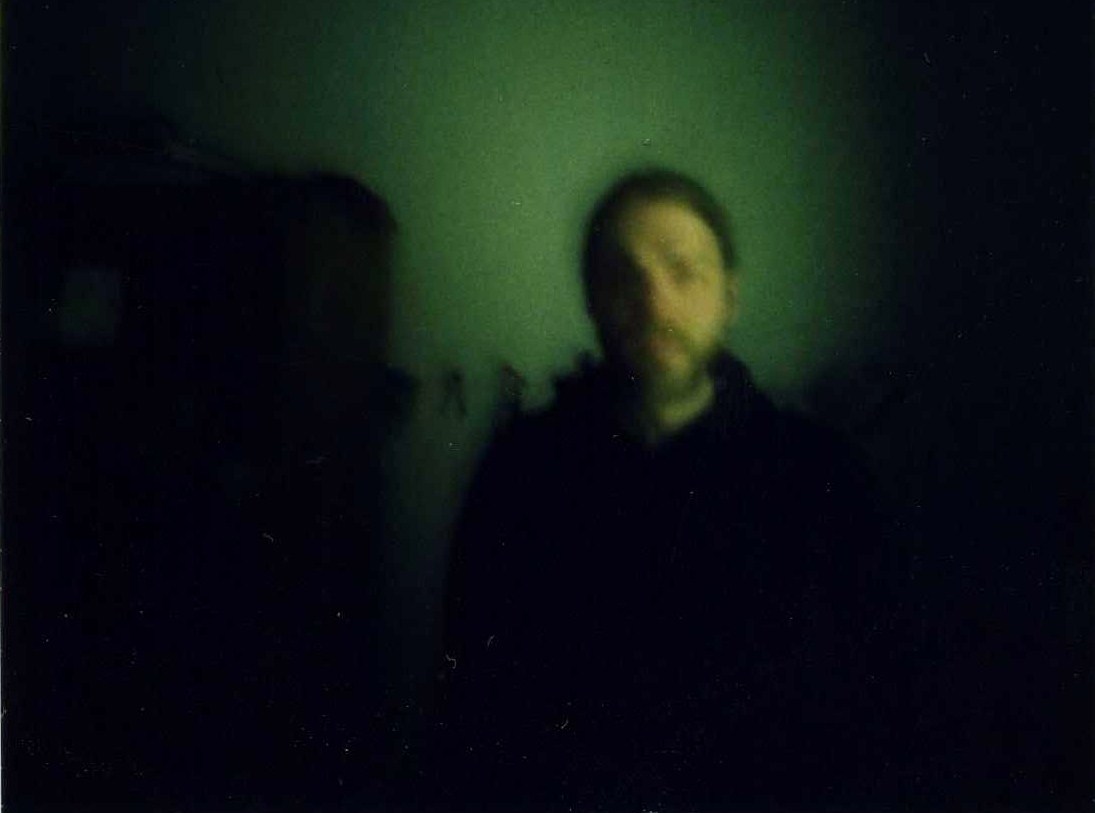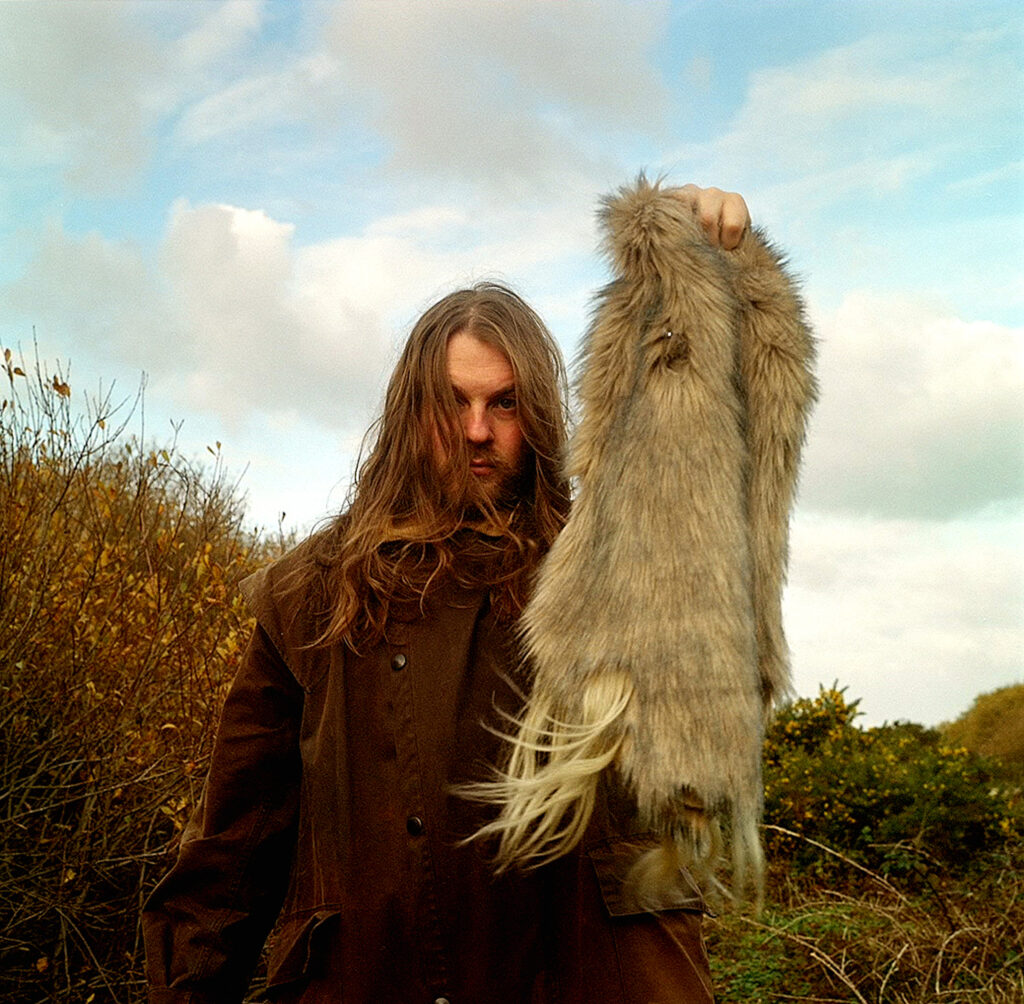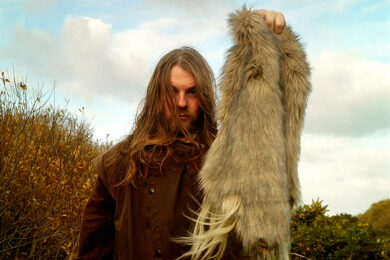Alexander Tucker’s gift is bound up in his instinct. Whether through collaborative work with Sunn O)))’s Stephen O’Malley (and countless others) or through his solo projects that survey drone to folk ballads, his is an unusual talent. His early work in hardcore band Suction (which took its musical influences from Swans and Fugazi, Tucker says) provided a template for the kind of sound he would start to explore throughout the 90s: noisy, punky and arresting. However, perhaps it is his own take on music that is most thrilling; his fascination with improvised sound and field recordings are a huge part of his soundscapes, along with tape loops, cello, mandolin, FX pedals and, at one point, the hum of the trains that were part of his domestic soundscape while he lived above Warren Street station.
2005’s Old Fog is probably one of his most affecting albums, because it manages to reconcile so many of his seemingly disparate interests and influences. We are drawn into a record that sees Tucker tip-toe through the most eerie of worlds, where old shanties vie with groaning instruments, as if he is finding the most haunted aspects of the electric guitar as well as his own voice. The word that comes to mind is ghostly, and the effect is beautiful, but also disconcerting. It sounds like an old fog akin to the kind Dickens writes about in Chapter One of Bleak House, that swirls around city and sea, until it actually consumes: "Fog in the eyes and throats of ancient Greenwich pensioners, wheezing by the firesides of their wards; fog in the stem and bowl of the afternoon pipe of the wrathful skipper, down in his close cabin." Like Dickens, Tucker’s work is lyrical, unsettling, and true.
Another word synonymous with Tucker is mystical, which 2006’s Furrowed Brow is further evidence of this. At first he makes things sound so familiar – the intense finger plucking of the guitar, the doom-laden atmosphere, the mournful vocal – but then the harmonies begin to take on a different shape again; a darker but no less compelling sound, taking on many of his old influences and turning them upside down, propelling us into further thrilling musical territory (which continues on in 2008’s Portal and this year’s Dorwytch).
His eclectic musicianship is why he is in such demand as a collaborator from various different corners (O’Malley through to Khanate and Daniel Beban), and perhaps reflects back into his solo work. Certainly, the sheer scale and depth of Dorwytch is a testament to his collaborative experiences. Here the busy, insistent ‘His Arm Has Grown Long’ with tearing strings and mesmerising vocal is put alongside the almost medieval-sounding ‘Red String’, and it makes you wonder if Tucker was composing all of this while locked in a tower with only a lyre and unidentifiable gruel for company. But then, you get ‘Half Vast’ with an opening that could have come direct from a Junior Boys record, and you suddenly wonder why everyone doesn’t produce records that are both as medieval and modern sounding as this. Then again, not everyone is Alexander Tucker – even his name sounds Chaucerian, and his work is a wonderful reckoning that sounds like a meeting of minds between the outer recesses of Fairport Convention, and Owen Pallett’s darker, disturbed cousin. In other words, completely wonderful, and truly original.
Alexander Tucker – His Arm Has Grown Long from Thrill Jockey Records on Vimeo.
You started off with Suction in the early nineties. How did that come about, and had you really been searching to play with a band? Had you been playing much music on your own beforehand?
Alexander Tucker: I was 17 when I started singing in Suction, and I’d probably wanted to be in a band since I was about 14. I didnt have any musical skills whatsoever, but really wanted to play guitar in a band. I had a few classical guitar lessons but really hated learning all the boring techniques, and soon sold my classical guitar for an electric and a cheap practice amp. I would wring out screaming feedback and thrash the shit out of it; quite often, I would only have about three strings left on there as I didn’t know how to restring a guitar, but I was already learning how to manipulate sound and create drones and resonances. Back then my good friend DCW Briggs had started a punk band and they needed a vocalist so I volunteered my services. I knew I could sing, shout, write words and had plenty of ideas – I felt this was my only way into a band as I was still very insecure about my playing ability.
Considering your musical experiences from Unhome to Fuxa, which would you say have been some of the most magical musical experiences, and how would you describe that your evolution as a musician over the years? Are there certain musical themes that keep coming through?
AT: There have been many magical moment over the year. When a show goes well, it still fills me with a feeling of life and new possibilities opening up. Playing at the Tate Britain for a Spartacus Chetwynd performance was a great experience. Since I was a child I’d always wanted to have a painting in the Tate, so playing there was my chance to fill the building with something of my own.
My musical evolution has always been in a process of discovery and documenting that process. Each album maps my own journey into sound and music making. From my early bedroom noise experiments I learned how to control feedback and sound. I didn’t know how to write a song or even play chords. Sound making was so immediate, you didn’t have to know your E’s from your F’s. I always like the idea of repetition, and the way you could take a small amount sound or words and create something epic and expansive. In Unhome I would write these short sentences and repeat them over and over building up a mantric melody. This theme of repetition and looping made it possible for me to create my own take on composing – I used to buy these TDK loop tapes and make up little sound collages of radio static, effected vocals and feedback and marvel each time the loop came around.
Were you quite nervous releasing your first solo record in 2000? It was such a complex collection of compositions, how long did it take to record?
AT: I was really excited when the U Sound Archives CDR came out. It took about a year to record in all. Previous to those tracks, I had been making recordings of improvisations onto dictaphones and mini-discs. I planned to edit these together and make a seamless collage, but I didn’t like the relentless nature of those abstract noise improvisations. I’d also had so many complaints from my neighbours about the noise I was making, so I switched to playing acoustic instruments which pushed me into writing more song based compositions. I had been listening to a lot of John Fahey, Jandek, Oval, Papa M, Alexander Spence and Dead C, and wanted this mixture of primitive finger plucked guitar and basic electronics all wrapped around a sort of warped song; I imagined these amps made of mud and vines which omitted weird organic sound waves. I was also sort of in and out of a weird mindset over the course of this album so it charted the rise, fall and rise of my mid to late 20s.
With the complexity of your compositions in mind, how long has it taken to feel comfortable taking your work out live? Or do you feel comfortable at all live?
AT: My live work is a sort of compromise on my recorded work. I only use loop pedals because I wanted to get away from the politics of being in a band, but still have an ensemble sound. I do feel comfortable live, but it sometimes feels like getting on the back a high-speed horse with only the mane to cling on to. At some points I feel as though I will be thrown off at any minute, but I like the fragility of making music this way – building something out of nothing and getting slightly different results each time. I’ve always liked the idea that a song can take any form to the point of it becoming completely unravelled or densely composed.
I often think of your work in relation to hauntings – radiant hauntings, that you are honouring so much that has gone before, but also creating a very modern soundscape, like a different kind of folk music, which is possibly all about ghosts and the universal tradition of human experience…
AT: I’m always looking for the past in the present and imagining alternate versions of my surroundings. My Dad brought me up to have a real appreciation of the past; we would go fossil hunting and bottle digging in Victorian land fills. He has huge postcard collections from saucy seaside cards to circus freaks. I have felt at different times that we are surrounded by ghosts, and all their memories are stored in the soil of the earth. I don’t really see my music as folk, only in as much as the songs are about human experience and that I’m using some acoustic instruments.
Your process also incorporates many ‘found’ sounds, such as keeping some of the street noise/trains in Old Fog. I liked the idea that you incorporated another aspect of the world in your recording, was that very important to you? Was it a happy time living above Warren Street tube stations?
AT: When I was at art college I got really into making field recordings, and some of these are on the Unhome album and a few are on my first album. I process the recordings through the fx pedals and reconfigure them on the loopers and build this fractured landscape from the raw recordings. The track ‘Darkrift/Black Road’ on Dorwytch is made in this way; there’s even a little bit from Evil Dead II in there somewhere. When I recorded the the first album and Old Fog above Warren Street tube station, they were very much about the sensation of living within the noise of central London and embracing this, but trying to blot it out at the same time.
I was also really into the Harry Smith anthologies and New Zealand experimental music; I liked the idea that a field recording could capture the music and its surroundings, and record a single moment in time.
How would you describe your work with Stephen O’Malley?
AT: Working with Stephen is always a joy. We both love the drone.
What do you look for in a collaborator, and who have some of your favourite collaborators been?
AT: Some of the best collaborators are people I have known for years. Paul May is amazing, he’s a totally underrated free improv drummer; Daniel O Sullivan, who recorded most of the new album, is someone I love playing with. We have a new project called Grumbling Fur coming out on Aurora Borealis soon, which also features Jussi Lehtisalo from Finnish band Circle, and Dave Smith from Guapo. We spent a day improvising and then later reconfigured and added parts in the studio. I’m also playing with members of Sunday Mourning and Moss under the name Black Abba.
A few years ago, you performed as part of Owen Pallett’s mini festival Maximum Black, which had such great programming, a really alive sense of music. Did you enjoy the experience, and if you had to programme your own mini festival, who would be on the billing?
AT: I really enjoyed the Maximum Black festival. It was great to play with O’Malley and to be the only performers playing this long extended drone thing, the indie kids hated us [laughs]. If I could curate my own festival it would feature Terry Riley, Melvins, Moss, Alastair Galbraith, Bardo Pond, Duke Garwood, Gate, The Bohman Brothers, The Haxan Cloak, Ashtray Navigations, Omit… I could go on and on ,but these are some of the current artists working today that I love.
Furrowed Brow was another brilliant musical experiment. Did you view it as a sea change of sorts? It seemed to set another kind of template for Portal and, most recently, Dorwytch.
AT: With Furrowed Brow, I was getting into these longer compositions that were quite dense in their instrumentation but were punctuated with these heavy doom riffs. I was really into doom bands and Swedish psych rockers Trad Gras Och Sterner and Parson Sound. Each album I make is another volume, continuing themes from the last, whilst introducing new elements and ideas. I like deconstructing things but still having an idea of a song at the heart of it.
Dorwytch is a great record, and there is a real joy to it, especially on a song like ‘Sill’. Was it a real joy to make, where you could really lose yourself in the moment and the process?
AT: Each track was a joy to make, and luckily I can still surprise myself and open up new things that I didn’t know I was capable of. This album is the first where I have these heavy classical string pieces coupled with straighter songs. I have a very intimate relationship with the music. I have always tried to make music that I would like to hear myself; Tim Smith from the Cardiacs once said ‘You have to be in your own favourite band’. I love this term. I want to feel enveloped by the music, surrounded by a world of my own making.

You’re also a visual artist – when did this begin, and do you see it as much a part of you as your music? I’ve become quite fascinated by outsider artists and their relationship to music. In the last year Kings Go Forth commissioned Mingering Mike for the artwork for their record The Outsiders Are Back, and Sufjan Stevens used a Royal Robinson piece for The Age of Adz. Is that an aspect of visual art that interests you?
AT: Visual art was my first passion in life. From an early age all I wanted to do was be a painter; I spent years studying art, but by the end of art college I was already moving away from the art world, and music and sound was starting to take its place. Although recently I have got back into oil painting – the cover to the IMBOGODOM record and Dorwytch are both paintings – all the other album covers were black and white ink drawings, so it’s been good to ring the changes and to bring in colour to the new records. I really love outsider art, I’ve been a huge Henry Darger fan for a long time and I love the fact that these artists are outside the whole uptight art world. It seems like the last place that their redundant theory cannot penetrate.
Do you think your vocal has changed much over the years? Have you learned a lot about using your vocal? On Dorwytch it sounds like you are in complete possession of it – it’s very striking and beautiful…
AT: Part of me feels that not much has changed with my vocals. It’s probably the thing I am most confident about, as it is the thing I’ve done for the longest. I started using a slightly higher register after I got into people like David Crosby and Alexander Spence. It seemed like in the 60s and 70s, men were not so afraid to sound more feminine or ethereal. I do really enjoy singing and using the voice as another instrument to compliment the arrangements.
I think of beauty as ever more important in the world, the artist has often such a critical role, a reflective fearless role. What do you think?
AT: Beauty comes in all different shapes and forms – even the most ugly things can have a sort of beauty to them. I try to bring a harmony to my music whether it be complimentary or opposing forces. All I try to do is create something which is about my honest feelings and emotions, and finding beauty in all of these confusing human aspects.



